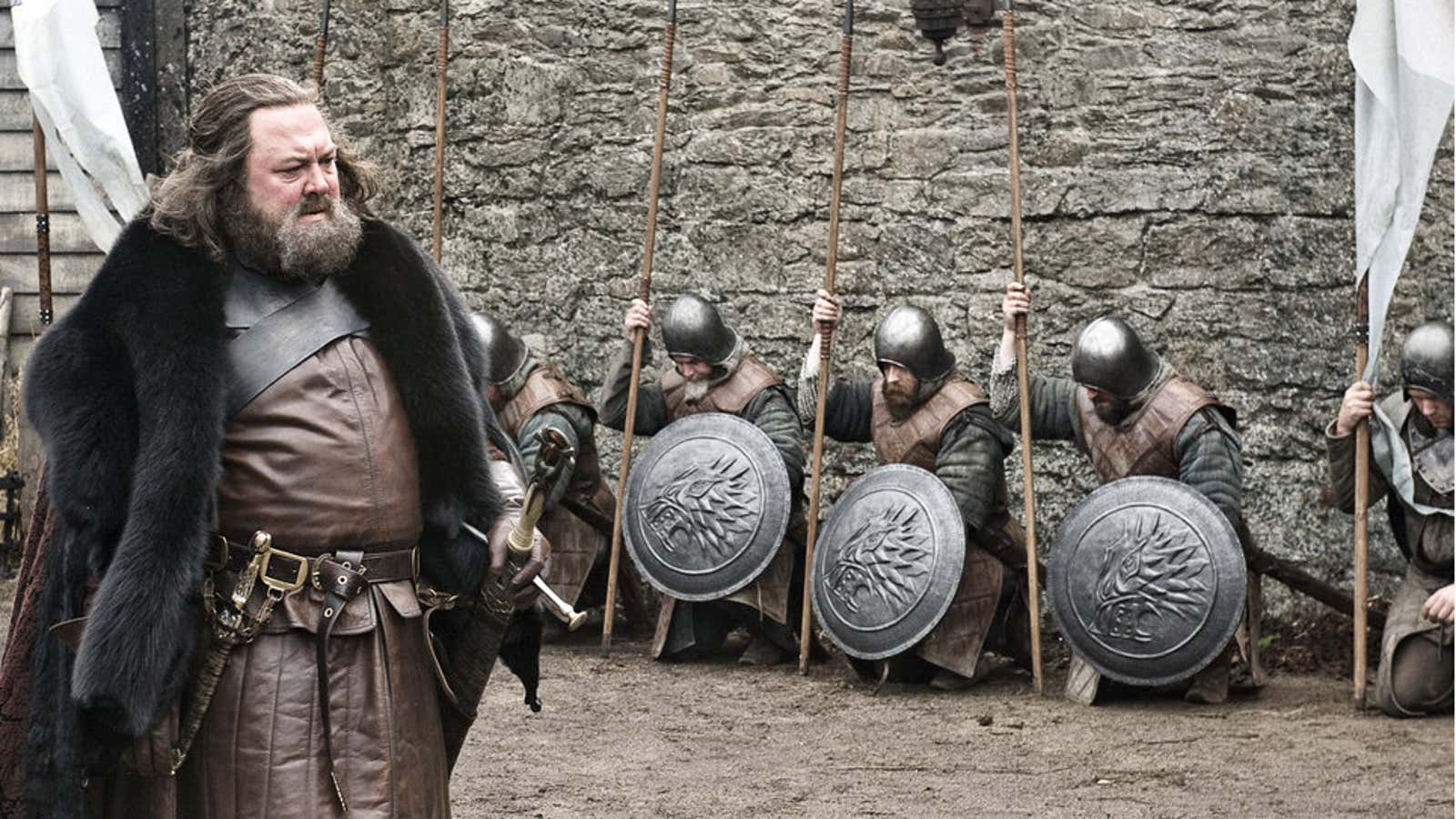On Sunday, Games of Thrones makes its much-heralded return as season five kicks off. As usual, the season will be 10 episodes long, the maximum number of shows that HBO can produce each year given its massive production scale.
Game of Thrones “is an overwhelming production,” Michael Lombardo, president of HBO programming, told Quartz. “For the cast and crew, who I’d argue is simply one of the best in the industry, delivering the 10 episodes every year is a challenge in itself given that each is equivalent to a theatrical shoot.”
Given the Thrones’ huge ratings and culture impact—it’s now HBO’s signature show—the network would love to entice viewers with more episodes each year. “If we could do 12 episodes of Game of Thrones, we would,” Lombardo told TV reporters in 2011, shortly after season one aired.
Back then, a 10-episode season was the exception for the premium network, where many of its series aired 12-episode seasons. Now it’s become the norm for HBO: none of its current series—including Veep, Silicon Valley, The Leftovers and True Detective—have seasons of more than 10 episodes. (Some, like Getting On, have just six shows per season.) The last to go longer was Girls, which had 12 episodes for season three early last year, before going back down to 10 in season four.
The network has quietly been heading in this shorter-season direction for a couple years. Two of HBO’s recent long-running dramas, True Blood and Boardwalk Empire, each began with several 12-episode seasons; Empire’s 2014 finale lasted just eight episodes, while True Blood’s final two seasons in 2013 and 2014 were 10 episodes each. Previously, Six Feet Under and The Sopranos used to be 13, but 12-episodes seasons had became the norm in the last decade.
Despite appearances, however, HBO insists that there is no 10-episode edict in place. “The number of episodes for any of our series is determined by the story,” Lombardo told Quartz. “From conversations with showrunners, writers and/or producers, we find the appropriate amount of episodes necessary to tell that particular story. You never want to rush or drag out a story, so this is a very important step in the production process.”
While HBO sometimes orders smaller initial seasons, particularly for its comedies (where eight-episode freshman seasons are the norm), “overall, we tend to stay consistent in episode number order from the second season of each series and onward,” said Lombardo. “But, we do not have a set rule for that determination.”
In other words, HBO says that it could greenlight a season of more than 10 episodes, but the network doesn’t feel that any of the shows on its slate warrant a longer season (with the possible exception of Thrones, where they are locked into 10 episodes regardless of how many they’d like to make each year). But this runs counter to what Girls executive producer Judd Apatow told HitFix last year, in lamenting the reduction of Girls’ fourth season from 12 episodes to 10. “I am a big fan of doing more episodes,” Apatow said. “Unfortunately, most of the shows on HBO are 10 episodes, so I think we will be doing 10 next year. We don’t line up with anybody when we do 12.”
HBO isn’t the only cable network that has largely moved to a 10-episode model: Amazon, Comedy Central, Lifetime, A&E, and History have all followed suit with their recent series. Meanwhile, Showtime has stayed at 12 episodes, Starz committed to 16 episodes of its new freshman hit Outlander (split into 8-episode half-seasons) and Netflix sticks to the 13-episode standard for most cable series seasons.
“For a first-year series, we often want to test the waters a bit with a shorter season,” explains Nina Lederman, Lifetime’s SVP of scripted programming and development. “It’s less pressure on the writers and producers when they know they are focusing on storylines and characters for nine episodes, with the pilot already shot. This allows everyone to get into the series’ rhythm and work through the creative elements and production schedule.”
And while it’s cheaper to produce a 10-episode season versus 12 or 13, “a 10-episode season can still be sold internationally and to other platforms,” says Lederman, who notes that sometimes, actors are more attracted to a show with a shorter season lengths, which gives them more time each year to pursue other projects. “In success, subsequent seasons certainly can jump to 13 if the creative and editorial support it.”
While the shorter seasons might make networks and some stars happy, they also condense the timeframe in which audiences can enjoy—and discuss—their favorite series each year. “I am a fan of shows being on the air for a long time so we can talk about them every week and are part of our lives,” said Apatow. “The idea that they pop up and disappear very quickly, I find disturbing. … I think [season three] benefited from having more. You can go deeper into the ideas you’re expressing.”
